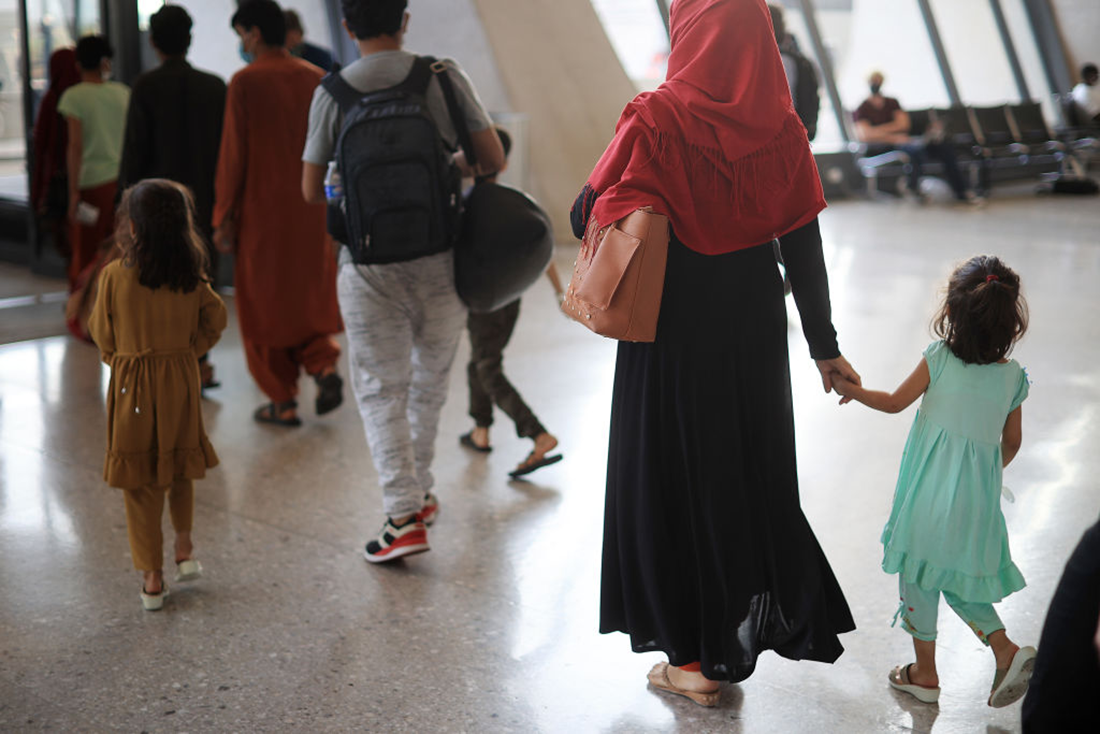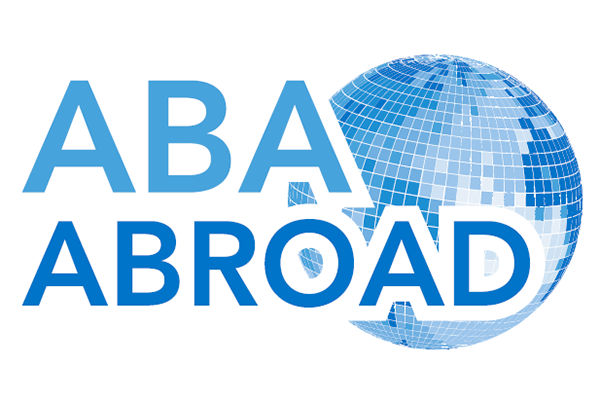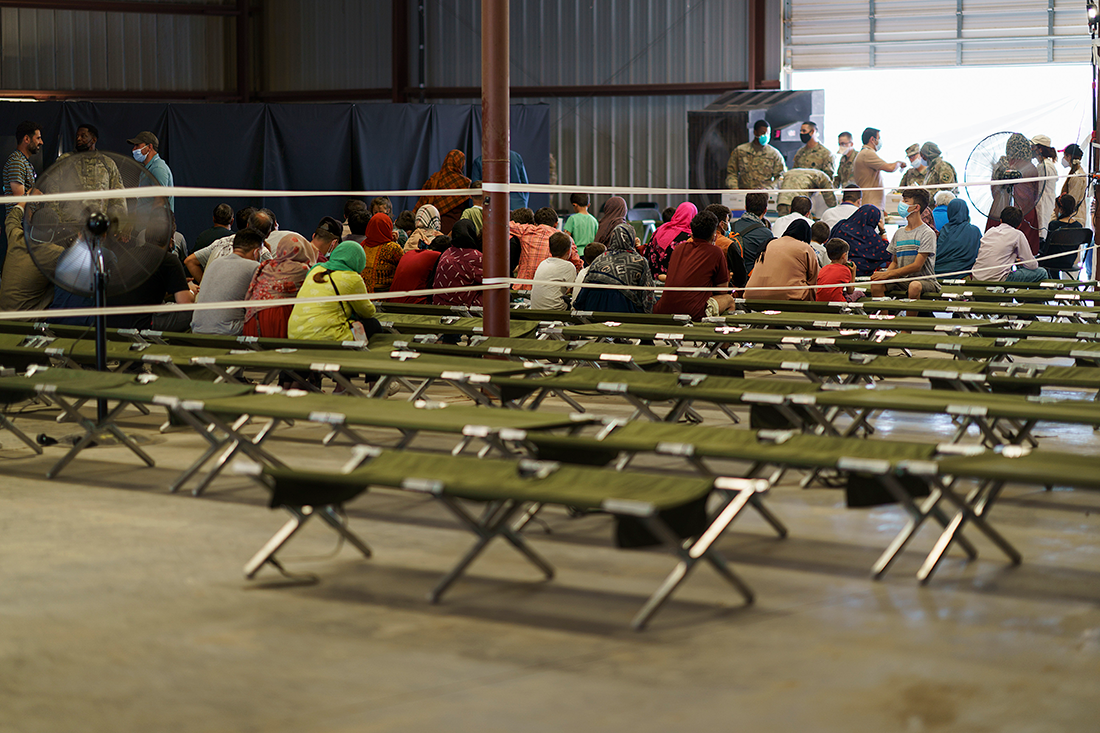The ABA is working to help Afghan refugees, and so can you

Refugees arrive at Dulles International Airport in Virginia after being evacuated from Afghanistan in August. (Photo by Chip Somodevilla/Getty Images)
As the United States was completing the withdrawal of its forces from Afghanistan in August, the American Bar Association began working to address the needs of Afghans. At first, this assistance came in the form of volunteer ABA members and staff preparing recommendation letters for evacuating Afghans seeking Special Immigration Visas. Simultaneously, individual ABA members and staff were preparing to provide pro bono legal assistance.

On Aug. 16, ABA President Reginald Turner issued a statement and established the Afghanistan Response Project to help coordinate these efforts and explore additional opportunities for the ABA to aid endangered Afghans. The work of ARP is coordinated by a working group comprised of various ABA entities, particularly the Commission on Immigration and the Rule of Law Initiative and chaired by the ABA’s Center for Global Programs. The ARP Working Group uses the legal expertise of the ABA community to support displaced Afghans as they journey to safety.
Building a foundation of ABA policy for further engagement, the Commission on Immigration is cosponsoring Resolution 608 for consideration by the ABA House of Delegates during the ABA Midyear Meeting to support the ABA’s advocacy for humanitarian protections for vulnerable Afghans at home and abroad. The safety, evacuation, and resettlement of Afghans who worked for or collaborated with the United States and other individuals at risk under the Taliban rule, including lawyers and judges, journalists, academics and educators—especially women and girls in these groups—are of great concern to the ARP Working Group.
This resolution would support advocacy in efforts to facilitate the exit or evacuation of individuals from Afghanistan and allow for prompt admission and streamlined adjudication of applications for status and related benefits; offer an opportunity for Afghan nationals paroled into the United States to apply for lawful permanent resident status under criteria like those applicable to individuals processed abroad and admitted as refugees; and ensure the authorization of adequate appropriations to facilitate and streamline the processing of these immigration benefits.
 Afghan refugees are processed at Fort Bliss in New Mexico in September. (AP Photo/David Goldman)
Afghan refugees are processed at Fort Bliss in New Mexico in September. (AP Photo/David Goldman)
Securing a safe exit from Afghanistan
The first priority for endangered Afghans is to secure exit from that country. As a result, the ABA partners with organizations to ensure justice sector and rule of law professionals from Afghanistan are identified by the U.S. Department of State. The ABA has connected more than 6,000 Afghans with the State Department. While this does not ensure evacuation, it is a critical first step for those seeking relocation. Once they have evacuated, the ABA seeks to support Afghans who have successfully transited to U.S. military bases or other “lily pads,” temporary processing points for evacuated Afghans at U.S. military installations in the Middle East and Europe. Once there, the evacuees begin the process of seeking status to come to the United States or transit from military bases here.
At the request of the State Department and through its Foreign Service Institute, ABA Commission on Immigration staff drafted community-facing scripts to help create videos that explain the asylum process in the United States that have been shared with resettlement agencies across the country and the U.S. military bases where Afghans are staying pending resettlement into the communities. The videos are available in English, Pashto and Dari.
While the work on the lily pads is critical, the ABA is also concerned about the status of Afghan allies who did not manage to enter the formal Operation Allies Welcome immigration process available to them. There remain hundreds of thousands of Afghans displaced by the U.S. withdrawal around the world—including thousands of rule of law professionals.
Recruiting pro bono volunteers for resettlement support
Currently, the ABA is working to develop an intake process for refugees to help match the potential for permanent resettlement with the hundreds of pro bono attorneys and law firms that have expressed an interest in aiding. The ARP will be deploying teams to third countries where Afghans are staying in refugee camps or other facilities provided by the governments of those countries to help develop a program to help them navigate complex processes as they seek permanent resettlement in the United States. Please consider donating to help provide pro bono assistance to Afghan legal professionals currently outside of the Operation Allies Welcome process.
As of Nov. 15, there were 70,192 Afghans who had been granted parole to enter the United States, according to CBS News, and estimates indicated more than 40% of those individuals would not be eligible for SIVs and might need to apply for asylum, an often-complex form of immigration relief. The Commission on Immigration is working with partners to meet this need in several ways. For example, the commission partnered with HIAS to increase Afghan asylum-seekers’ access to legal information through the development of a Pro Se Asylum toolkit that has also been translated into Dari and Pashto. These resources will be shared with refugee resettlement agencies and communities nationwide that are providing direct services to resettled Afghans.
 A child holds up a piece of artwork while drawing in a tent at Fort Bliss in New Mexico, where Afghan refugees were being housed in September. (AP Photo/David Goldman)
A child holds up a piece of artwork while drawing in a tent at Fort Bliss in New Mexico, where Afghan refugees were being housed in September. (AP Photo/David Goldman)
HIAS also will identify individuals and families in need of legal assistance and work with the commission to place these cases for limited representation pro bono services by private attorneys and law firms. This “Pro se Plus” project for attorneys and law firms will provide short-term virtual representation, including affidavit preparation, country conditions research, asylum application drafting, evidence gathering and orientation on the interview process. The Commission on Immigration and HIAS have developed an Afghan Asylum Pro Bono Manual and will provide attorneys and firms with substantive training and support. A four-part substantive training is ongoing, and recordings will be available following the live event.
The Commission on Immigration also hopes to increase the capacity of legal service organizations by supporting Villanova University’s VIISTA program which was established to accredit participants to represent individuals before the Executive Office for Immigration Review and U.S. Citizenship and Immigration Services. The Commission on Immigration is raising funds to provide scholarships to 10 students to enroll in the VIISTA program in the hopes of increasing culturally and linguistically appropriate capacity.
For immigration and nonimmigration matters alike, the ABA has also been working with state, local, and affinity bars to identify potential pro bono assistance to help Afghans navigate the complicated requirements of resettlement in the United States. Overall, the need for legal services far outpaces the capacity of immigration legal services organizations in receiving communities. Generally, there is no government provision for free legal services to people in the immigration court system. Pro bono support is critical in addressing the basic legal needs of Afghans. Lacking stability in one’s legal status can impact these individuals’ ability to successfully join our communities.
Helping Afghan attorneys and judges
An area of resettlement not frequently highlighted is the need to help Afghans, particularly legal professionals who are now or will be settled in the United States, find meaningful work in the U.S. legal system. The ABA International Law Section has created an Afghan Professionals Resettlement Task Force, with an initial focus on gathering information about a potential program to find opportunities for Afghan women judges to be admitted to practice law in the U.S. The task force has been expanded to possibly include Afghan judges and lawyers of all genders.
The end goal of the potential project is to focus on a handful of promising U.S. jurisdictions (e.g., California and New York) where Afghan judges and lawyers can be admitted to the bar based on their legal education and experience in Afghanistan alone or supplemented with an LL.M. degree in American law from an ABA-accredited law school. The task force is also looking into possibly expanding the focus of the potential project to identifying opportunities for work in the U.S. legal system in nonlawyer capacities for Afghan lawyers and judges for whom seeking admission to the bar in a U.S. jurisdiction would not be practicable.
From the beginning of the humanitarian crisis in Afghanistan, the ABA has been mobilizing member and institutional resources to help America’s allies secure a better future for themselves and their families. This work seeks to leverage and support the talents of ABA members, staff, and allied organizations to help Afghans navigate through the complicated process of settlement.
While the ARP has managed to exceed the goals established at its founding, there remains an enormous amount of work to do. The ARP will work to find permanent settlement for Afghans in refugee camps around the world, freeing up space for additional evacuees. The ABA will partner with members and allies to help navigate the immigration process in the United States. And, once Afghans are resettled, the ABA is seeking to position itself to support Afghan legal professionals to find meaningful work.
Please contact [email protected] for more information or if you’re interested in volunteering to work on the ARP Working Group of the Afghan Professionals Resettlement Task Force, and share https://ambar.org/arp with your communities.
Mike Byowitz serves as chair of the Afghanistan Professionals Resettlement Task Force of the ABA International Law Section. He is of counsel and a former partner at Wachtell, Lipton, Rosen & Katz in New York City, serves as an at-large delegate in the ABA House of Delegates, is a former member of the ABA Board of Governors and is a past chair of the ABA International Law Section.
David Dettman is outreach director for the ABA’s Center for Global Programs. He also serves as a coordinator for the ABA’s Afghanistan Response Project.
Adonia Simpson is director of policy and pro bono for the ABA Commission on Immigration. She has focused her career on the representation and advocacy for vulnerable immigrants and ensuring fair treatment and full due process rights for immigrants, asylum-seekers and refugees within the United States.
ABA Abroad is a column highlighting the work of the ABA’s Center for Global Programs, which comprises the Rule of Law Initiative, Center for Human Rights and the ABA’s presence at the United Nations.
This column reflects the opinions of the authors and not necessarily the views of the ABA Journal—or the American Bar Association.
Updated on Feb. 11 to provide links to the Pashto and Dari translations of the Pro Se Asylum toolkit.



